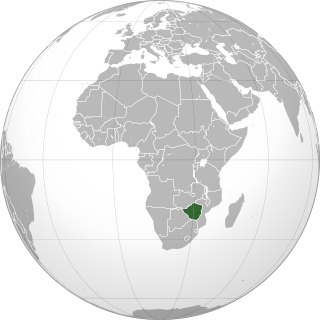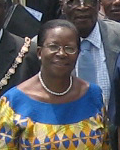
Yvonne Vera was an author from Zimbabwe. Her first published book was a collection of short stories, Why Don't You Carve Other Animals (1992), which was followed by five novels: Nehanda (1993), Without a Name (1994), Under the Tongue (1996), Butterfly Burning (1998), and The Stone Virgins (2002). According to the African Studies Center at University of Leiden, "her novels are known for their poetic prose, difficult subject-matter, and their strong women characters, and are firmly rooted in Zimbabwe's difficult past." For these reasons, she has been widely studied and appreciated by those studying postcolonial African literature.

Lesbian, gay, bisexual, transgender, and queer (LGBTQ) people in Zimbabwe face legal challenges not experienced by non-LGBTQ residents. Since 1995, the Government of Zimbabwe has carried out campaigns against LGBTQ rights. Sodomy is classified as unlawful sexual conduct and defined in the Criminal Code as either anal sexual intercourse or any "indecent act" between consenting adults. Since 1995, the government has carried out campaigns against both homosexual men and women.
Widow inheritance is a cultural and social practice whereby a widow is required to marry a male relative of her late husband, often his brother. The practice is more commonly referred as a levirate marriage, examples of which can be found in ancient and biblical times.

Olivia Nyembezi Muchena is a Zimbabwean politician and the former Minister of Higher Education in the Cabinet of Zimbabwe. She has also served as the Minister of Science and Technology Development and as the Minister of Women's Affairs.
Munacho T.A. Mutezo is a Zimbabwean engineer, businessman and politician. He was born on 14 February 1954 in Chimanimani, Zimbabwe.
Prostitution in Zimbabwe and related acts, including solicitation, procuring, and keeping a brothel, are illegal but thriving. Zimbabwe's dire economic situation has forced many women into sex work.

HIV and AIDS is a major public health issue in Zimbabwe. The country is reported to hold one of the largest recorded numbers of cases in Sub-Saharan Africa. According to reports, the virus has been present in the country since roughly 40 years ago. However, evidence suggests that the spread of the virus may have occurred earlier. In recent years, the government has agreed to take action and implement treatment target strategies in order to address the prevalence of cases in the epidemic. Notable progress has been made as increasingly more individuals are being made aware of their HIV/AIDS status, receiving treatment, and reporting high rates of viral suppression. As a result of this, country progress reports show that the epidemic is on the decline and is beginning to reach a plateau. International organizations and the national government have connected this impact to the result of increased condom usage in the population, a reduced number of sexual partners, as well as an increased knowledge and support system through successful implementation of treatment strategies by the government. Vulnerable populations disproportionately impacted by HIV/AIDS in Zimbabwe include women and children, sex workers, and the LGBTQ+ population.
Siphiwe Hlophe is the co-founder of Swaziland for Positive Living, an NGO that provides counselling and education, and seeks to improve the living conditions of people who are affected by or infected with HIV in the rural areas. The organisation has been described as "Swaziland's most innovative and motivated HIV/AIDS mitigation programme". She is also the President of Positive Women, a UK-based charity founded by Kathryn Llewellyn and Stephen Brown

Patricia McFadden is a radical African feminist, sociologist, writer, educator, and publisher from Eswatini. She is also an activist and scholar who worked in the anti-apartheid movement for more than 20 years. McFadden has worked in the African and global women’s movements as well. As a writer, she has been the target of political persecution. She has worked as editor of the Southern African Feminist Review and African Feminist Perspectives. She currently teaches, and advocates internationally for women's issues. McFadden has served as a professor at Cornell University, Spelman College, Syracuse University and Smith College in the United States. She also works as a "feminist consultant", supporting women in creating institutionally sustainable feminist spaces within Southern Africa.
Charlene Leonora Smith is a South African journalist, published author of 14 books, and is an authorized biographer of Nobel Peace Prize winner, and former South African President, Nelson Mandela. She is a communications and marketing consultant, and writing teacher, who lives and works in the United States.

Ronnie Mutimusekwa (1955-1992) was the first AIDS activist in Zimbabwe, Africa.
Elinor Sisulu is a South African writer and activist, who grew up in Zimbabwe.
Zethu Matebeni is a sociologist, activist, writer, documentary film maker, Professor and South Africa Research Chair in Sexualities, Genders and Queer Studies at the University of Fort Hare. She has held positions at the University of the Western Cape and has been senior researcher at the Institute for Humanities in Africa (HUMA) at UCT. She has been a visiting Professor Yale University and has received a number of research fellowships including those from African Humanities Program, Ford Foundation, the Fogarty International Centre and the National Research Foundation.

Prudence Nobantu Mabele was a South African activist who advocated for the rights of women and children living with HIV/AIDS, and against gender-based violence. She was diagnosed with HIV/AIDS in 1990 and went public with her status in 1992. She set up the Positive Women's Network in 1996. She worked with UNAIDS and also qualified as a sangoma. She was the recipient of many awards, including the Felipa de Souza award in 1999. In 2004, she carried the Olympic flame. She died in 2017 and in her memory the International AIDS Society set up an annual prize for gender activists.
Dawn Cavanagh is a South African activist, writer and feminist.
Leickness Chisamu Simbayi is a South African research psychologist and professor. He is the current Deputy Chief Executive Officer for Research of the Human Sciences Research Council where he studies the social aspects of STIs and HIV/AIDS. In 2002, Simbayi was a part of the research team that conducted the first South African National HIV Prevalence, Incidence, Behaviour and Communication Survey and has been involved in the implementation of all subsequent surveys.

GALZ An Association of LGBTI People in Zimbabwe is an organisation established in 1990 in Harare to serve the needs of the lesbian, gay, bisexual, transgender and intersex (LGBTI) community in Zimbabwe. GALZ's vision is "a just society that promotes and protects human rights of LGBTI people as equal citizens in Zimbabwe".
Bibata Ouédraogo is a Burkinabé feminist, women's rights activist and former school teacher.
Felistas Murata, popularly known as Mai Tt is a Zimbabwean comedian, socialite and recording artist as well as an activist for the rights of people living with HIV/AIDS.
Fulata Lusungu Mbano Moyo is a Malawian systematic and feminist theologian who is an advocate for gender justice. Moyo has written over twenty-eight journal articles.








